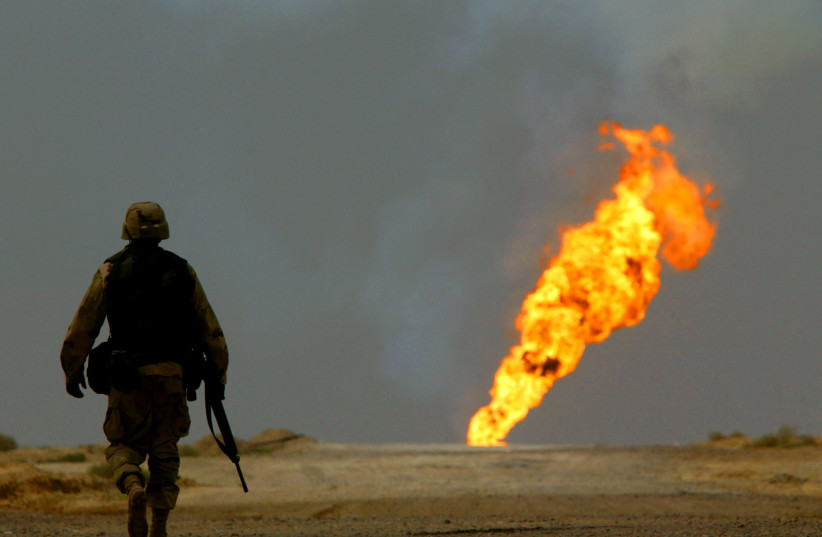Twenty years ago, the United States invaded Iraq, launching a ferocious bombing campaign dubbed “shock and awe.”
For more stories from The Media Line go to themedialine.org
The US invaded Iraq on the premise that the oil-rich state possessed weapons of mass destruction, that it was later discovered never existed, throwing the country into chaos. A civil war ensued in Iraq triggered by the invasion.
Former President George W. Bush said that the invasion was an effort to disarm the country, free its people and "defend the world from grave danger."
Two decades later, Iraq remains devastated from the years of war, occupation and bloody sectarian turmoil that ensued.
No major celebrations were held in Iraq on March 20, the anniversary of the day that the US launched its ground invasion of Iraq.

“It was a grave mistake committed by the Americans, they didn’t plan this properly and they destroyed the country.”
Former Iraqi general
Some 4,600 US service members were killed, as well as more than 200,000 Iraqis, mostly civilians, during the US-led campaign in Iraq. While the invasion succeeded in toppling Iraq’s dictatorial president, Saddam Hussein, it ultimately plunged Iraq into a bloody sectarian conflict.
US forces remained in Iraq for eight years before withdrawing.
Saddam ruled Iraq for more than two decades and many Iraqis have described his rule as "brutal." Under his reign there was no political freedom, and numerous human rights violations were committed. Saddam’s overthrow brought happiness and a sigh of relief for many Iraqis, who hoped a political change for the better was underway.
A former Iraqi general who fled the country after the US invasion told The Media Line that the military campaign brought about catastrophic results, and chaos that Iraq is still reeling from two decades later.
“It was a grave mistake committed by the Americans, they didn’t plan this properly and they destroyed the country,” he said.
The general, who lives in a neighboring country, did not want to reveal his identity so that he would not upset his host country.
Allawi, a butcher in Mosul, watched two of his brothers get killed by fellow citizens in the early days of the invasion. He told The Media Line that the horrific incident traumatized him, and he has yet to recover.
“I blame the Americans for losing my brothers even though they were killed by other Iraqis simply because they were Sunnis,” Allawi said. “Our future was destroyed so Bush could satisfy his ego and hatred for Saddam.”
Abdallah Mansour was only 11 years old when the invasion happened. He lived with his family in the Iraqi capital, Baghdad. He clearly remembers the night of March 20th, 2003.
"I was afraid, we couldn’t sleep for days," he told The Media Line.
Iraqis were terrified of Saddam, who ruled with an iron fist. Many hoped, following the invasion, that together they would build a new Iraq.
“I had mixed feelings after the invasion, but I thought life would change for the better. That did not happen: we lost our house in Baghdad; my family was chased out; and we now live in a rental house. My father lost his store, he couldn’t handle it; he died shortly after,” said Mansour.
Iraqis lived in fear under Saddam; Not even the most influential was able to stand up to him and criticize or challenge his policies.
“Yes, he was ruthless, he ruled with fear, but we felt safe,” said Fahad Ali, a store owner in Baghdad.
“It was almost impossible to have internet service, or a satellite in Iraq – the government controlled everything,” he said.
“The Americans made many promises to Iraqis and kept none of them. Bush said he was going to help us build a democratic country, that never happened,” Ali said.
It is not unusual these days to hear people lament the days of Saddam Hussein’s rule.
"We wish that Saddam's rule could return,” Ali said.
The deposed Iraqi president ruled a country that was stable, provided a state of the art education system, and health services to all Iraqis; and those who joined the Ba’ath party enjoyed top government positions.
Sectarian violence
The US imposed a system of government that split power along ethnic and sectarian lines between the country's three main groups, Shia Muslims, Kurds and Sunni Muslims. Armed militias fought the occupiers and each other, and killed each other's civilians.
Jihadist groups took advantage of the chaos, and their hatred for the Americans.
There is still widespread corruption in Iraq and, despite millions of barrels of oil reserves, the country lacks even the most basic services, like electricity.
However, things are not all bad in Iraq. Several elections have been held, political plurality exists, and free expression is officially guaranteed, but people complain that all this has not brought the economic and political stability they say was promised.
Baghdad is undoubtedly safer now, however.
“I can take my family out and walk freely in Baghdad,” said Ali, a 39-year-old university lecturer. He told The Media Line that he thinks the future looks bright for his country.
“Many costly mistakes were committed but we are learning and moving forward,” he said.
